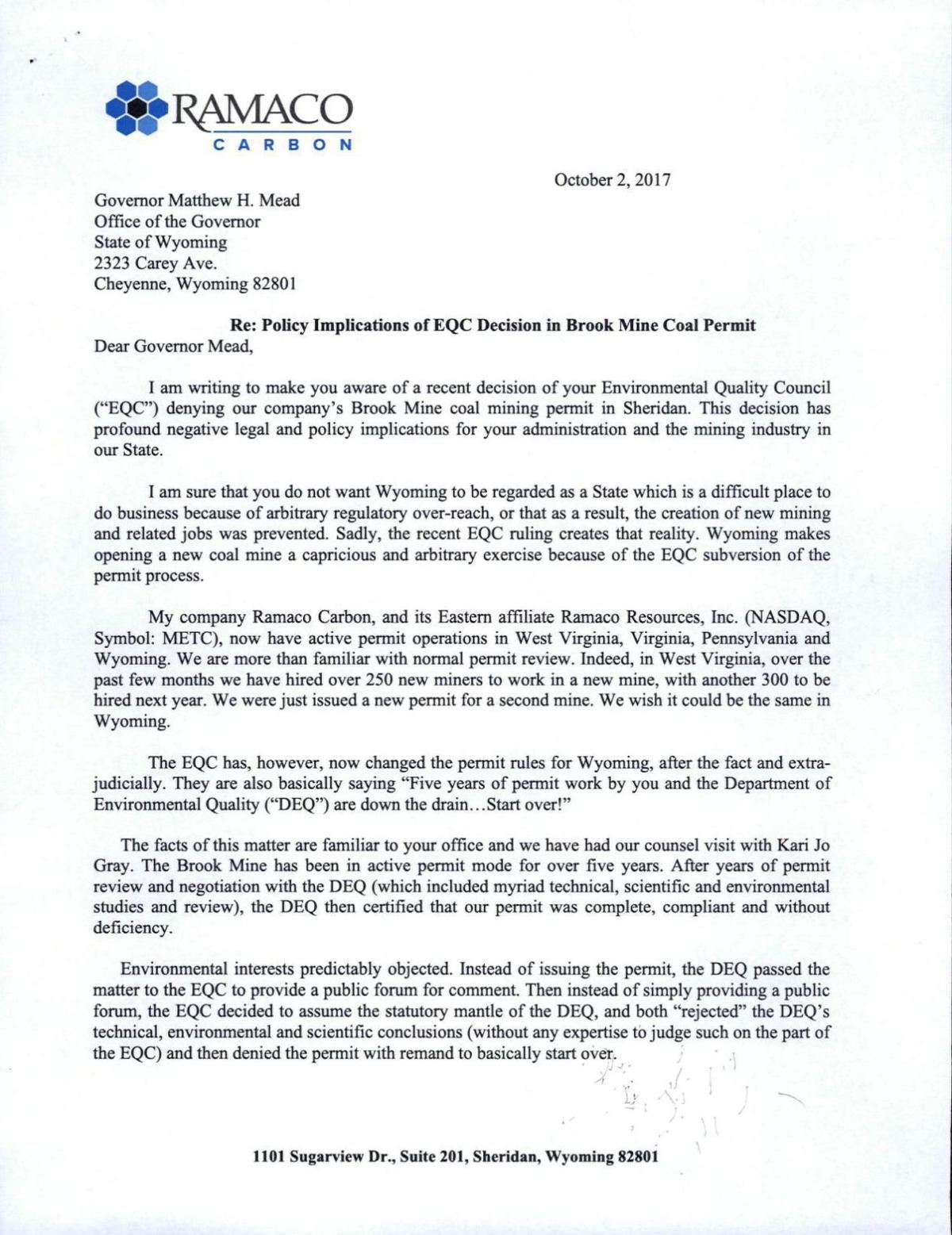Wyoming Coal Firm Appealed to Governor Over Denied Mine Permit

By Heather Richards
April 20, 2018 - A coal company denied a permit in northern Wyoming last year sought respite from Gov. Matt Mead and the head of the Department of Environmental Quality, apparently to no avail.
In a letter sent less than a week after an environmental review board’s decision to deny Ramaco Carbon’s permit for the Brook mine in Sheridan County, CEO Randall Atkins sent a letter to Mead and Todd Parfitt proposing an “elegant solution” to the delay: impose some additional mining restrictions but hand over the permit.

“We can live with these new conditions if we are able to have a permit issued now by the DEQ and move on,” Atkins wrote on Oct 2. “We do not want the delay and cost of starting the permit process all over again after years of work and review.”
Ten days later, the Department of Environmental Quality upheld the environmental review board’s decision to deny the permit, which still allows Ramaco to make changes and resubmit the mining plan.
The letter was obtained through a public records request from the Powder River Basin Resource Council, a group of landowner advocates in Sheridan County that opposed Ramaco’s permit.
Ramaco’s spokeswoman declined to comment given the company’s active case in the Cheyenne district court.
Michelle Panos, a policy advisor for the governor, said Mead believes the Environmental Quality Council process works.
Ramaco’s frustration over the denied permit did appear to sway some lawmakers in Wyoming. During the legislative session earlier this year a handful of legislators proposed defunding the Environmental Quality Council’s second year budget as a result of the Ramaco decision.
Rep. Donald Burkhart, R-Rawlins, and Rep. David Miller, R-Riverton said the board was giving Wyoming an anti-business reputation and that the council appeared to be acting out of its intended role. Others countered that the council had done what it is charged to do by statute, and withholding funding would be retaliation against an independent body.
The measure to defund the council failed after criticism that it was a punitive move, but the issue continues to rankle a number of lawmakers. A review of the Environmental Quality Council, its staffing and its funding is likely to take place during the interim session. Lawmakers may also be briefed on a review of the Department of Environmental Quality’s Land Quality Division, which oversees coal mine permitting, to better understand ways to streamline mining permits.
The governor does not share the concerns voiced by lawmakers since the Ramaco decision. The Department of Environmental Quality and the Environmental Quality Council have different responsibilities in Wyoming, Mead’s policy advisor Michelle Panos said in an email Thursday.
“The DEQ is charged with protecting the environment while supporting the stewardship of natural resources. The Environmental Quality Council plays an important role in cases where a party disagrees with the decision, and a court can weigh in afterwards,” Panos said. “In this instance, the mining company did appeal to the state district court in Cheyenne. The governor believes the process is effective as it is.”
Ramaco Carbon has come up against a number of challenges since it announced its intentions with the Brook Mine. The company entered a dispute in 2014 with neighboring coal company Big Horn Coal and a local ranch over right of ways and mine boundaries.
Last year, it appeared Ramaco had moved forward on what would be the first new coal mine in Wyoming in decades. The Department of Environmental Quality deemed the company’s mine plan technically complete, a final step before acquiring a permit to mine. However, local landowners, some former coal miners themselves, and Big Horn Coal, which has rights neighboring Ramaco’s proposed site, took issue with the company’s mining plan.
They argued that the company did not provide an adequate study of the impact of mining on the surrounding area noting concerns with issues like blasting, subsidence potential and local water wells.
State regulators pushed the issue before the Environmental Quality Board, which hears contested cases. A series of hearings led to a final decision in late September that the mining plan was “inadequate.”
Days later, Atkins penned the letter to the governor, noting some of the same concerns that lawmakers would take up later.
“I am sure that you do not want Wyoming to be regarded as a state which is a difficult place to do business because of arbitrary regulatory over-reach,” Atkins wrote. “Sadly, the recent EQC ruling creates that reality. Wyoming makes opening a new coal mine a capricious and arbitrary exercise because of the EQC subversion of the permit process.”
Ramaco conceded in a public statement after the Department’s decision that it would work with the state to improve the mining plan for future permitting. It also noted its intention to take the Environmental Quality Council decision to court, which it did.
Ramaco recently filed a court brief asking the judge to interpret Wyoming statute. As in its letter to the governor, Ramaco argued that the council should be considered a “public forum” for private individuals or companies to air their complaints. The ultimate decision, however, should be the Department of Environmental Quality’s. Therefore, the director erred in following the environmental council’s permit denial, the company said.
The department, though it vociferously defended its decision that the mine plan was adequate during the environmental review hearings, justified its stance that the council is a decisive body and argued that Parfitt acted appropriately in abiding by the council’s decision, according to court documents.
The Powder River Basin Resource Council also filed an extensive argument disputing Ramaco’s interpretation of the council’s role according to statute.
Shannon Anderson, a lawyer for the council, said Ramaco’s appeal attacks the regulatory process that’s been in place for decades. The company’s fight over the permit undermines appropriate study of mining’s impacts, particularly when it comes to water, she said.
“That really goes to the heart of coal mine permitting across the nation, but particularly here in Wyoming when we are mining in a drinking water aquifer,” she said. “When you take out the coal, you take out that drinking water, and it’s really important to have a good assessment of hydrogeological (impacts.)”
As far as the political pressure on the Environmental Quality Council, Anderson said the council’s independence from the Department of Environmental Quality is a vital tool for groups like the Powder River Basin Resource Council. Ultimately an appeal process had to exist, she said.
“I think the most important thing for us is that there is a process that meaningfully allows citizens to raise objections, present evidence and be heard and taken seriously,” she said.
Ramaco’s public persona more recently has centered on its other coal ventures in Sheridan County. With or without the Brook Mine, Ramaco intends to build a coal research facility on alternative uses for coal and a manufacturing center to explore coal-based products.
CoalZoom.com - Your Foremost Source for Coal News

